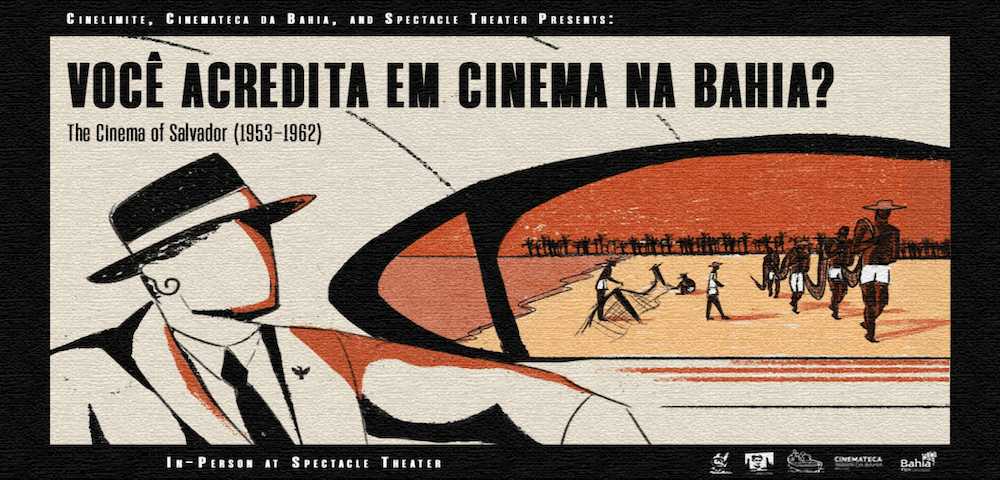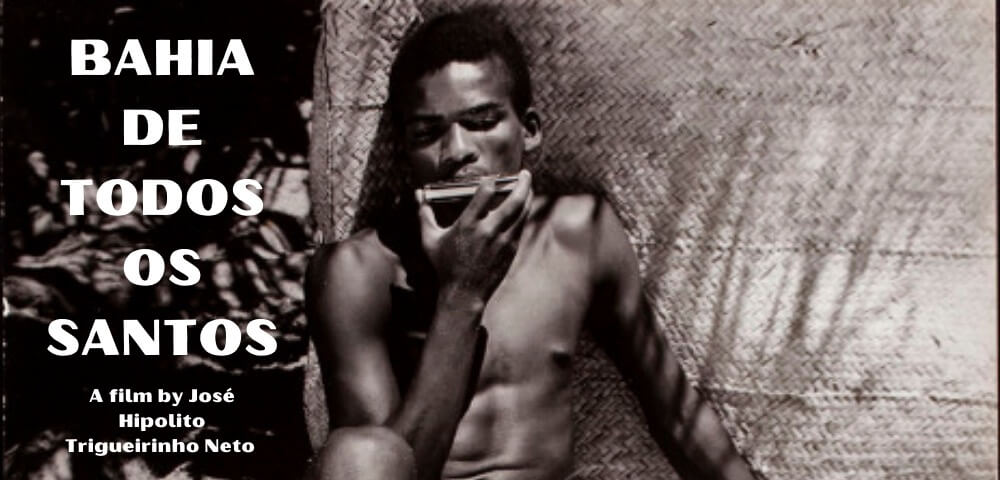
In the 1950s, the city of Salvador, Bahia, was in a state of cultural effervescence. For the first half of that decade, Alexandre Robatto Filho – virtually the only filmmaker in the state with a steady career – refined his filmmaking skills as he transitioned from commercial newsreels to more aesthetically ambitious documentary shorts. Meanwhile, film critic Walter da Silveira founded the Clube de Cinema da Bahia, where classic and avant-garde European films were shown and discussed, in a salon-like fashion, influencing a generation of future filmmakers.
Among those were Glauber Rocha, Roberto Pires and Luiz Paulino dos Santos. Inventive and eager to experiment, these filmmakers would shape the history of Brazilian cinema in the following decades, in congruence with other young filmmakers who were shifting away from the studio-era style of production that was still prevalent in the southeastern states of Rio de Janeiro and São Paulo.
Throughout the decade, Salvador would witness the evolution of its filmmaking, from Robatto Filho’s documentary shorts to the first ever Bahian feature film, Roberto Pires’ REDENÇÃO.
Around 1957, when the production of REDENÇÃO began, a new wave of Bahian filmmakers and film enthusiasts would graffiti the walls around Salvador with the question “Você acredita em cinema na Bahia?” [Do you believe in cinema in Bahia?]. It served as a provocation as much as a call of action as Glauber Rocha’s and Roberto Pires’ films would go on to be consider landmarks of the incipient Cinema Novo movement which firmly cemented Bahia on the cinematographic map in Brazil.
Spectacle Theater, Cinelimite, and the Cinemateca da Bahia are proud to present, “Você Acredita em Cinema na Bahia? – The Cinema of Salvador (1953-1962)”.
Featuring films directed by Roberto Pires, Glauber Rocha, Alexandre Robatto Filho, Jose Hipolito Trigueirinho Neto, and Luiz Paulino dos Santos.
Special thanks to: Petrus Pires, Sonia Robatto, Paloma Rocha, Inajara Diz Santos, Menderson Correia Bulcão, Talis Cícero Castro Miranda Menezes, Jamile Menezes de Almeida Santos, Fraternidade Federação Humanitária Internacional, Evandro O. Leite, Francisco Paulino dos Santos, Gustavo Menezes, Matheus Pestana, & William Plotnick.
3 X ROBERTO PIRES

REDENÇÃO
dir. Roberto Pires, 1959
65mins. Brazil.
In Portuguese with English subtitles.
NORTH AMERICAN PREMIERE!
SATURDAY – MAY 7 – 7:30pm (+Introduction by Thotti Cardoso)
THURSDAY MAY 12 – 10:00pm
SUNDAY MAY 22 – 7:30pm
THURSDAY MAY 26 – 7:30pm – (Special Event Q&A With Theo Duarte)
Roberto Pires’ debut feature film, REDENÇÃO (1959) is a desperate and moody film noir dealing with the psychological pressures of crime and punishment.
Often considered one of the first ever Brazilian scope films, REDENÇÃO makes use of the homemade “IGLUSCOPE”, which Pires designed himself while working out of his father’s glasses shop in Bahia. The film makes great use of its anamorphic format and plays out like a lazy fever dream, capturing the entire terrain of the Salvador coast while the grim news of a psychopathic murderer hums through the car radio.
Screening with:

PÁTIO
dir. Glauber Rocha, 1959
11 mins. Brazil.
In Portuguese with English subtitles.
Glauber Rocha’s debut short film, Pátio, shot in 1959 with leftover film stock from Roberto Pires’s Redenção, is a Buñuelian experiment about a man and a woman who move slowly across a chess-shaped terrace, rolling on the ground, moving both closer and further apart.

A GRANDE FEIRA
dir. Roberto Pires, 1961
91 mins. Brazil.
In Portuguese with English subtitles.
NORTH AMERICAN PREMIERE!
SUNDAY, MAY 8 – 7:30 PM
THURSDAY, MAY 12 – 7:30 PM
SATURDAY, MAY 14 – 10 PM
SUNDAY, MAY 22 – 5 PM
Produced in the Água de Meninos market of Salvador and made with the assistance of Glauber Rocha, A Grande Feira is a neo-realist ensemble film featuring some of the biggest stars of Cinema Novo which include Spectacle goddess, Helena Ignez, Luiza Maranhão (also stars in BARRAVENTO), Antônio Pitanga, & Geraldo del Rey, who appears in all of Roberto Pires’ films from this era.
A GRANDE FEIRA is a political film of manners exploring the historical dialectic between capital and work in a stunning formalist verite.
Screening with:

VADIAÇÃO
Dir. Alexandre Robatto Filho, 1954
8 mins. Brazil.
In Portuguese with English subtitles.
Focusing on capoeira, VADIAÇÃO was previously storyboarded by artist Carybé. Its soundtrack preserves the typical chants and berimbau music which are part of that practice, as the film illustrates the evolution of capoeira, simultaneously a martial art and a dance.

TOCAIA NO ASFALTO
dir. Roberto Pires, 1962
101 mins. Brazil.
In Portuguese with English subtitles.
NORTH AMERICAN PREMIERE!
TUESDAY MAY 10 – 7:30pm (Special Event Q&A with Richard Peña)
SUNDAY MAY 15 – 7:30pm
SATURDAY MAY 21 – 10:00pm
SUNDAY MAY 29 – 5:00pm
Arguably Roberto Pires’ masterpiece, the 1962 film TOCAIA NO ASFALTO, is a suspenseful sociological film noir about the political corruption in Salvador, Bahia and the underground crime scene that is embedded through the fabric of the city.
Told through the narratives of a young idealist organizer, a countryside hitman, and a greedy propagandistic politician, Roberto Pires’ 1962 film is a stylistic wonder, with framing, chiaroscuro, & montage that rival the greatest of western arthouse directors, set against the beautiful coastal backdrop of Salvador, the heated downtown streets, and the haunted gothic architecture of the Saint Francis church.
GLAUBER ROCHA’S BARRAVENTO

BARRAVENTO
dir. Glauber Rocha, 1962
78 mins. Brazil.
In Portuguese with English subtitles.
THURSDAY, MAY 5 – 7:30
SATURDAY MAY 28 – 7:30
“The Tricontinental cinema must infiltrate the conventional cinema and blow it up.” – Glauber Rocha
Shot on location in a highly stylized high-contrast black & white, Glauber Rocha’s debut film, BARRAVENTO (1962) tells the tragic tale of a man who tries to liberate his people from the mystical Candomblé religion, which he recognizes an oppressive tool of social and political control.
Screening in a new restoration. Special thanks to Kino Lorber.
Screening with:

ENTRE O MAR E O TENDAL
dir. Alexandre Robatto Filho, 1953
21 mins. Brazil.
In Portuguese with English subtitles.
Dental surgeon Alexandre Robatto Filho had been filming documentary shorts in Salvador since the 1930s, but it was with ENTRE O MAR E O TENDAL that he refined and developed his authentic style. Shot in the Chega Nego and Carimbamba beaches, this short portrays the daily work of a fishing community as they catch xaréu fish (Caranx hippos).
TRIGUEIRINHO NETO’S BAHIA DE TODOS OS SANTOS

BAHIA DE TODOS OS SANTOS
dir. Trigueirinho Neto, 1961
100 mins. Brazil.
In Portuguese with English subtitles.
SATURDAY MAY 14 – 7:30 PM
FRIDAY MAY 20 – 10 PM – (Special Event Q&A with Nicolas Pedrero-Setzer)
SUNDAY MAY 29 – 7:30 PM
One of the classical precursors of the Cinema Novo movement, Trigueirinho Neto’s BAHIA DE TODOS OS SANTOS tells the story of a young man, Tônio, who runs away from home to live with petty criminals on the beach. When his gang kills a policeman during a workers strike, they are forced into hiding and begin contemplating ways to escape Bahia and avoid imprisonment.
Screening with:

UM DIA NA RAMPA
dir. Luiz Paulino dos Santos, 1960
10mins. Brazil.
In Portuguese with English subtitles.
UM DIA NA RAMPA explores a day on the market ramp of the Mercado Modelo in Salvador, Bahia, where saveiros arrive returning from the Recôncavo Baiano with products for trade in the capital. Traditions of capoeira, candomblé and other customs are presented throughout the course of this 1955 film.
